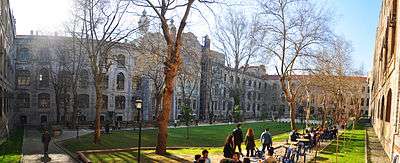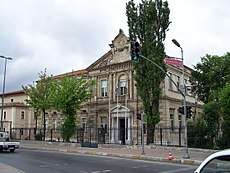Health care in Turkey
Healthcare in Turkey consists of a mix of public and private health services. Turkey has universal healthcare under its Universal Health Insurance (Genel Sağlık Sigortası) system. Under this system, all residents registered with the Social Security Institution (SGK) can receive medical treatment free of charge in hospitals contracted to the SGK.[1]
.jpg)
Coverage


Due to major health reforms in the 2000s and 2010s, universal health insurance coverage for the population was achieved, and the general quality of health services improved greatly, with patient satisfaction rising from 39.5% in 2003 to 75.9% in 2011.[2]
The following medical treatments are covered by the SGK:[1]
- Emergencies
- Work accidents and vocational illnesses
- Infectious diseases
- Preventive health services (drug and alcohol abuse)
- Childbirth
- Extraordinary events (injuries from war and natural disasters)
- Fertility treatment for women younger than 39
- Cosmetic surgery deemed medically necessary
While some SGK-contracted hospitals offer dental care, in most cases, patients must rely on private dental services and are responsible for covering the costs. In addition, patients must partially cover the cost of some prescription drugs and outpatient services.[1][2]
Medication
As measured in defined daily doses per 1,000 inhabitants per day Turkey had a high rate of consumption of antibiotics in 2015 with a rate of 38.8, double that of the United Kingdom. [3]
Private healthcare

There is also a large private healthcare sector. Private health services often offer shorter waiting lists and higher quality services. Most banks and insurance companies offer health plans, and contract with certain hospitals and doctors.[1]
The Turkish healthcare system used to be dominated by a centralized state system run by the Ministry of Health. In 2003 the governing Justice and Development Party introduced a sweeping health reform program aimed at increasing the ratio of private to state health provision and making healthcare available to a larger share of the population. Information from the Turkish Statistical Institute states that 76.3 billion liras are being spent on healthcare annually, with 79.6% of funding coming from the Social Security Institute and most of the remainder (15.4%) coming from out-of-pocket payments.[4] There are 27.954 medical institutions, 1.7 doctor for every 1000 people[5] and 2.54 beds for 1000 people.[6]
Private healthcare has increased in Turkey in the last decade due to the long queues and personal service in state-run hospitals. Most private hospitals have contracts with various insurance companies so it is now possible to receive treatment that varies from the state. After rising competition from private hospitals, there has been an increase in the quality of state hospitals. At 7.6% of gross domestic product (GDP) in 2005, Turkey's public expenditure on national health was below average than that of the developed countries, although the percentage has increased steadily since 2000. In the early 2000s, about 63 percent of health expenditures came from public sources. In 2006 there was one doctor for every 700 people, one nurse for every 580 people, and one hospital bed for every 380 people. The rural population is poorly served by the healthcare system, which is much more developed in the western half of the country. Between 80 and 90 percent of the population, including self-employed workers, have healthcare provided by the national pension system, but are often drawn to private health providers in urban areas due to the higher-quality care. Although the private health industry has grown rapidly since the 1990s, only about 2% of the population, mainly in urban areas, has private health insurance. In 2005 about 75 percent of private health expenditures were out-of-pocket rather than being covered by insurance.[7]
Turkey had a scheme called green card (Yeşil Kart), which was developed in order to help low-income social group to get medical help. Spending on this system were equal to 40 billion TL in 2010. Due to this fact, the system was reformed in 2011 and the number of people who could benefit from this system was reduced. Following the 2012 Universal Health Insurance Law, the Green Card system was abolished.[8][9]
Medical tourism
There is a substantial medical tourism business in Turkey, with almost 178 thousand tourists visiting for health purposes in the first six months of 2018. 67% used private hospital, 24% public hospitals and 9% university hospitals. The Regulation on International Health Tourism and Tourist Health came into force on July 13th 2017. It only applies to those coming specifically for treatment.[10]
Finance
Turkey had the lowest expenditure on healthcare in Europe in 2015 - 6.4% of Gross domestic product.[11]
See also
- Category:Hospitals in Turkey
- Health in Turkey
- Memorial Health Group
- Turkish Medical Association
References
- "The Health Insurance System in Turkey". Angloinfo. Angloinfo. Retrieved 2016-06-15.
- Atun, Rifat (2015). "Transforming Turkey's Health System — Lessons for Universal Coverage". New England Journal of Medicine. 373 (14): 1285–1289. doi:10.1056/NEJMp1410433. PMID 26422719.
- "UK antibiotic consumption twice that of the Netherlands, WHO report finds". Pharmaceutical Journal. 14 November 2018. Retrieved 22 December 2018.
- http://www.hurriyet.com.tr/ekonomi/24892271.asp
- "Physicians (per 1,000 People)." Physicians (per 1,000 People). World Bank, n.d. Web. 19 Mar. 2015.
- http://www.tuik.gov.tr/UstMenu.do?metod=temelist
- Turkey country profile. Library of Congress Federal Research Division (August 2008). This article incorporates text from this source, which is in the public domain.
- "Blog Eniyihekim" (in Turkish). Eniyihekim. Retrieved 3 September 2015.
- http://www.valueinhealthjournal.com/article/S1098-3015(14)02905-2/abstract
- "International Health Tourism in Turkey". Lexology. 8 January 2018. Retrieved 13 February 2019.
- Ballas, Dimitris; Dorling, Danny; Hennig, Benjamin (2017). The Human Atlas of Europe. Bristol: Policy Press. p. 79. ISBN 9781447313540.